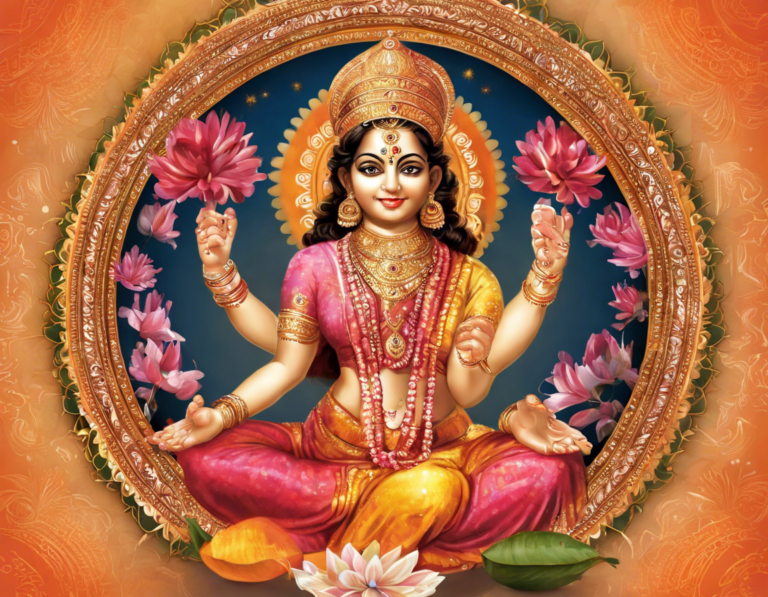
The Hindu New Year, also known as Gudi Padwa in Maharashtra, Ugadi in Karnataka and Andhra Pradesh, Puthandu in Tamil Nadu, and Vishu in Kerala, marks the beginning of the traditional Hindu lunar calendar. This auspicious day usually falls in the months of March or April and signifies new beginnings, growth, and prosperity. Celebrated with immense zeal and enthusiasm across India, the Hindu New Year is a time when families come together to partake in various traditional rituals, festivities, and gaiety. Let’s explore how this significant occasion is observed in different regions of the country.
Significance of the Hindu New Year
The Hindu New Year holds great significance as it symbolizes the harvest season and the onset of spring. It is believed to be an auspicious time to start new ventures, purchase assets, and cleanse one’s surroundings to invite positive energy into the home. The day is also considered auspicious for seeking the blessings of the deities for a prosperous year ahead. People engage in various rituals and festivities that are both religious and cultural in nature, which vary from region to region.
Gudi Padwa in Maharashtra
Gudi Padwa marks the Maharashtrian New Year and is celebrated with immense fervor in the state of Maharashtra. The day begins with a traditional oil bath followed by the hoisting of a Gudi (a decorated flag) outside homes. The Gudi symbolizes victory and prosperity and is believed to ward off evil spirits. Families come together to indulge in traditional sweets like Puran Poli and Shrikhand, and women adorn themselves in silk sarees and jewelry.
Ugadi in Karnataka and Andhra Pradesh
Ugadi, also known as Yugadi, is celebrated as the New Year in Karnataka and Andhra Pradesh. The day starts with a ritualistic bath and the Panchanga Sravanam, a practice of listening to the astrological predictions for the coming year. Homes are adorned with mango leaves and flowers, and people savor a traditional meal consisting of Ugadi Pachadi, a unique mixture of six different tastes symbolizing the various emotions one may experience in the coming year.
Puthandu in Tamil Nadu
Puthandu, also known as Tamil New Year, is celebrated in Tamil Nadu with great pomp and splendor. The day begins with an auspicious bath followed by the Kanni ritual, where an array of fruits, vegetables, flowers, gold, silver, and coins are arranged beautifully on a tray to signify prosperity and abundance. Families visit temples to seek blessings and prepare a sumptuous feast featuring traditional dishes like Mango Pachadi and Neem flower rasam.
Vishu in Kerala
Vishu marks the beginning of the Malayalam New Year in Kerala and is celebrated with a lot of enthusiasm. The day begins with the Vishukani ritual, where an array of auspicious items including rice, flowers, gold, new clothes, and coins are arranged in front of a holy lamp. The eldest member of the family then wakes up the others, blindfolds them, and leads them to see the Vishukani, signifying the vision of prosperity in the coming year. People also indulge in a grand feast known as the Sadhya.
Festivities and Traditions
Rituals and Customs
-
Ritualistic Baths: Taking a sacred bath is considered auspicious on the Hindu New Year as it symbolizes purification and cleansing of the mind and body.
-
Decorating Homes: Homes are adorned with rangolis, flowers, mango leaves, and torans to welcome prosperity and good fortune.
-
Offerings: People make offerings of fruits, flowers, coconut, jaggery, and incense sticks to the deities to seek their blessings for a prosperous year ahead.
Traditional Attire and Accessories
-
Women dress up in vibrant sarees and elaborate jewelry to mark the auspicious occasion.
-
Men wear traditional dhotis or kurtas along with headgear as a part of the customary attire.
Traditional Dishes
-
Ugadi Pachadi: A traditional dish made with a unique combination of six tastes – sweet, sour, bitter, salty, tangy, and spicy.
-
Mango Pachadi: A sweet and tangy preparation made with raw mangoes, jaggery, and neem flowers to symbolize the bittersweet experiences of life.
-
Sadhya: A grand feast featuring an array of vegetarian dishes served on a banana leaf in Kerala.
Family Bonding and Celebrations
-
The Hindu New Year is a time for families to come together, exchange gifts, and seek blessings from elders.
-
Festivities include music, dance, cultural programs, and community gatherings to celebrate the onset of the New Year.
Frequently Asked Questions (FAQs)
1. What is the significance of Gudi Padwa/Ugadi/Vishu/Puthandu?
Gudi Padwa, Ugadi, Vishu, and Puthandu are all regional variations of celebrating the Hindu New Year. They signify new beginnings, growth, prosperity, and the onset of the harvest season.
2. How is the Hindu New Year traditionally celebrated?
The Hindu New Year is celebrated with traditional rituals like ritualistic baths, decorating homes, offering prayers, wearing traditional attire, preparing delicious meals, and coming together as families.
3. What are some traditional dishes prepared during the Hindu New Year celebrations?
Some traditional dishes prepared during the Hindu New Year celebrations include Ugadi Pachadi, Mango Pachadi, Puran Poli, Shrikhand, Neem flower rasam, and Sadhya.
4. Why is the Gudi hoisted during Gudi Padwa?
The Gudi is hoisted during Gudi Padwa to symbolize victory, prosperity, and the warding off of evil spirits. It is believed to bring good luck and fortune to the household.
5. How do families seek blessings during the Hindu New Year celebrations?
Families seek blessings by visiting temples, offering prayers to the deities, seeking the blessings of elders, and performing traditional rituals like the Kanni in Tamil Nadu or the Vishukani in Kerala.
The Hindu New Year is a time of joy, hope, and renewal, where people come together to celebrate new beginnings and the promise of a prosperous year ahead. By partaking in traditional rituals, savoring delicious dishes, and cherishing time with loved ones, individuals usher in the New Year with positivity and optimism. Let the festivities of Gudi Padwa, Ugadi, Puthandu, and Vishu bring happiness and prosperity to one and all!